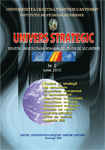IMUNITATEA SUVERANITĂȚILOR STRĂINE ÎN TRIBUNALELE S.U.A.: LEGISLAȚIE ȘI POLITICĂ
IMMUNITY OF FOREIGN SOVEREIGNS IN U.S. COURTS: LAW AND POLICY
Author(s): Chang OhrSubject(s): Politics / Political Sciences, Law, Constitution, Jurisprudence, International Law, Government/Political systems
Published by: Universitatea Crestina "Dimitrie Cantemir"
Keywords: differentiate state actions as private or public in nature; the awareness of all stakeholders in a claim; the common intervention of the Executive Branch on a claim against a foreign state;
Summary/Abstract: As a leading country, the United States historically has faced multiple conflicts with various sovereign states. From ancient mercantile disputes to modern complex financial transactions done with and by sovereign states; from war crimes and genocide to terrorism, U.S. courts increasingly face foreign states as defendants. The uncomfortable and arduous tasks courts have to deal with in these complex cases include: differentiate state actions as private or public in nature; the awareness of all stakeholders in a claim; the common intervention of the Executive Branch on a claim against a foreign state and the overlap of judicial scrutiny and foreign policy. This paper explores these issues.(1) We analyze the history and legal evolution of the concept of sovereign immunity in the United States: the absolute theory of immunity, the restrictive theory introduced by the Executive Branch and finally the Foreign Sovereign Immunities Act of 1976 (hereinafter FSIA). Special emphasis is given to FSIA’s commercial exception; the retroactivity of its application to acts is done by sovereign states before its enactment and the necessary nexus of the act with the United States. (2) We turn to the delicate question of political influence over judicial decisions when a sovereign country is a defendant. What kind of scrutiny should be taken? What deference (if any) to the Executive Branch should be given? How do these decisions affect U.S. foreign relations?(3) In conclusion, this paper suggests the equilibrium of judicial analysis and deference to the Executive Branch in foreign sovereign claims in order to avoid international turbulences on the public side, and the indiscriminate use of U.S. courts to resolve singular interests on the private side.
Journal: Revista Univers Strategic
- Issue Year: I/2010
- Issue No: 2
- Page Range: 53-69
- Page Count: 17
- Language: English

